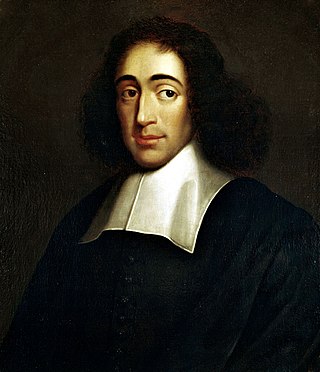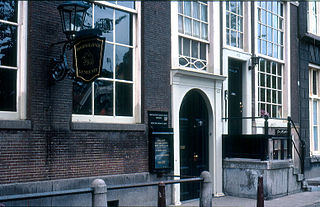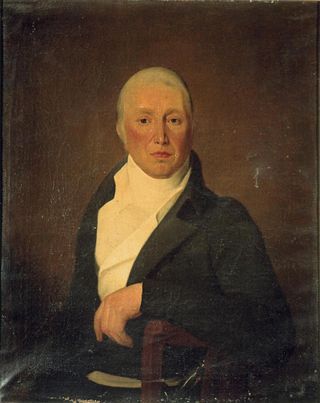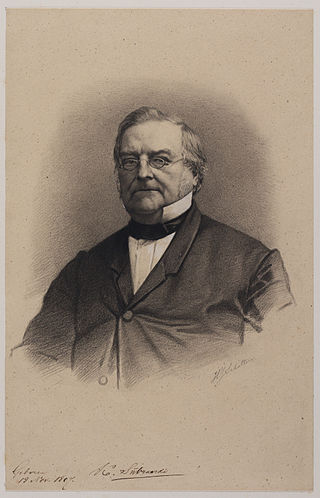History
Collegiants were an association, founded in 1619 among the Arminians and Anabaptists in Holland. The practice originated in 1619 when, after the Synod of Dort forced the States of Holland to dismiss clerics for encouraging refuge to individuals being persecuted for religious beliefs, three brothers of Warmond by the name of van der Kodde (or Codde)—Gijsbert, Jan Jacobsz, and Adriaen—decided to hold religious services of their own. The sect began as a refuge from the bitterness of the Calvinist and Arminian controversies of the day. Their name is derived from the custom they had of calling their communities "Colleges", as did Spener and the Pietists of Germany.
The Collegiants' first place of meeting was at the village of Warmond, at the residence of one of the brothers, but they shortly established their headquarters at Rijnsburg, a village 2.5 mi (4.0 km) northwest from Leiden, and were hence called the Rijnsburgers (Dutch: Rijnsburger Collegianten). In Rijnsburg, the Collegiants had a guest-quarter in the present-day alleyway of Kwakelsteeg called the Grote Huis (Large House).
There were also large communities of Collegiants in other places, for instance in Amsterdam and Hoorn. The Amsterdam college was founded in 1646 by Adam Boreel as a spiritualist cell, like those of Sebastian Franck and Kaspar Schwenkfeld, but Daniel De Breen, a Leiden-educated Remonstrant theologian, brought the college in line with Rijinsburger principles. A disaffected Mennonite, Galenus Abrahamsz (or Abrahamson), brought many other Mennonites to the Amsterdam college. In Amsterdam, the Collegiants ran an orphanage, 'De Oranjeappel', where the Dutch writer Aagje Deken was raised.

Baruch (de) Spinoza, also known under his Latinized pen name Benedictus de Spinoza, was a philosopher of Portuguese-Jewish origin. A forerunner of the Age of Enlightenment, Spinoza significantly influenced modern biblical criticism, 17th-century rationalism, and Dutch intellectual culture, establishing himself as one of the most important and radical philosophers of the early modern period. Influenced by Stoicism, Thomas Hobbes, René Descartes, Ibn Tufayl, and heterodox Christians, Spinoza was a leading philosopher of the Dutch Golden Age.

Menno Simons was a Roman Catholic priest from the Friesland region of the Low Countries who was excommunicated from the Catholic Church and became an influential Anabaptist religious leader. Simons was a contemporary of the Protestant Reformers and it is from his name that his followers became known as Mennonites.

The Mennonite Church in the Netherlands, or Algemene Doopsgezinde Sociëteit, is a body of Mennonite Christians in the Netherlands. The Mennonites are named for Menno Simons (1496–1561), a Dutch Roman Catholic priest from the province of Friesland who converted to Anabaptism around 1536. He was re-baptized as an adult in 1537 and became part of the Dutch Anabaptist movement.

Johannes Acronius was a German Reformed theologian. He is less known by scientific works, than by his part in the quarrel between Arminians (Remonstrants) and Contra-Remonstrants.
The Remonstrants is a Protestant movement that split from the Dutch Reformed Church in the early 17th century. The early Remonstrants supported Jacobus Arminius, and after his death, continued to maintain his original views called Arminianism against the proponents of Calvinism. Condemned by the synod of Dort (1618–1619), the Remonstrants remained a small minority in the Netherlands. In the middle of the 19th century, the Remonstrant Brotherhood was influenced by the liberal Dutch theological movement.

Agatha ("Aagje") Deken was a Dutch writer.
Adam Boreel was a Dutch theologian and Hebrew scholar. He was one of the founders of the Amsterdam College; the Collegiants were also often called Boreelists. Others involved in the Collegiants were William Ames, Daniel van Breen, Michiel Coomans, Jacob Otto van Halmael and the Mennonite Galenus Abrahamsz de Haan.

Petrus Serrarius was a millenarian theologian, writer, and also a wealthy merchant, who established himself in Amsterdam in 1630, and was active there until his death. He was born "into a well-to-do Walloon merchant family by name of Serrurier in London." He has been called "the dean of the dissident Millenarian theologians in Amsterdam".

Wybo Fijnje was a Dutch Mennonite minister, publisher in Delft, Patriot, exile, coup perpetrator, politician and – during the Batavian Republic and Kingdom of Holland – manager of the predecessor of the Staatscourant.

Pieter Teyler van der Hulst was a wealthy Dutch Mennonite merchant and banker, who died childless, leaving a legacy of two million florins to the pursuit of religion, arts and science in his hometown, that led to the formation of Teyler's Museum. This was not the value of his entire estate. He also founded Teylers Hofje in his name, and made important donations to individuals in the Mennonite community.
Frans Kuyper was a Dutch Socinian writer and printer.
Nicolaas Bidloo was a Dutch physician who served as the personal physician of Tsar Peter I of Russia. Bidloo was the director of the first hospital in Russia as well as the first medical school in Russia, and is considered one of the founders of Russian medicine.

The Doopsgezinde kerk is a historical hidden Mennonite church dating from the 17th century between the Grote Houtstraat, Peuzelaarsteeg and the Frankestraat in Haarlem, Netherlands.

Teylers Eerste Genootschap, also known as the Godgeleerd Genootschap is one of the two societies founded within the Teylers Stichting as a result of the will of the Dutch 18th-century merchant Pieter Teyler van der Hulst. The First Society is focused on theology, while the Second Society is focused on art and science.

Abraham de Vries was a Dutch Mennonite minister, author on literature and member of several societies, mainly literary ones.

Klaas Sybrandi, also spelled as Sijbrandi, was a Dutch Mennonite minister, author and translator who was involved with several societies and foundations.

Adriaan Loosjes, was a 19th-century botanist, poet, novelist and publisher born in Den Hoorn, North Holland, Netherlands.

Klaas van der Horst was a Dutch Mennonite teacher and minister.

Adriaen Verwer was a Dutch Mennonite merchant, scholar, philosopher and linguist. He wrote books on language, religion and maritime law. He is best known for his grammar Linguae Belgicae, published anonymously in 1707. He is often regarded as the linguistic mentor of his younger friend Lambert ten Kate.















